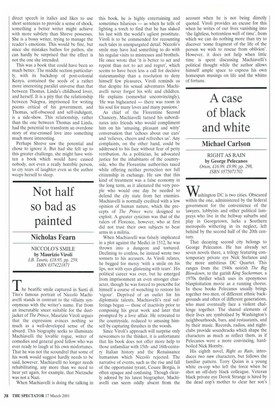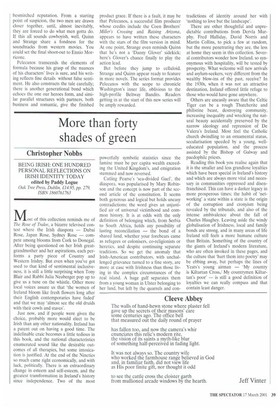A case of black and white
Michael Carlson
RIGHT AS RAIN by George Pelecanos
Orion, £16.99, £9.99, pp. 298, ISBN 0575071702
Washington DC is two cities. Obscured within the one, administered by the federal government for the convenience of the lawyers, lobbyists and other political lampreys who live in the beltway suburbs and play in Georgetown, lurks a Southern metropolis withering in its neglect, left behind by the second half of the 20th century.
That decaying second city belongs to George Pelecanos. He has already set seven novels there, a trilogy featuring contemporary private eye Nick Stefanos and the more ambitious DC Quartet. This ranges from the 1940s noirish The Big Blowdown, to the garish King Suckertnan, a 1970s thriller which uses its eponymous blaxploitation movie as a running chorus. In these books Pelecanos usually brings together two men, of different ethnic backgrounds and often of different generations, who must eventually face a violent challenge together. The shared elements of their lives are symbolised by Washington's neighbourhoods, bars, and restaurants, and by their music. Records, radios, and nightclubs provide soundtracks which shape the characters as much as reflect them, as if Pelecanos were a more convincing, hardboiled Nick Hornby.
His eighth novel, Right as Rain, introduces two new characters, but follows the familiar pattern. Terry Quinn is a young white ex-cop who left the force when he shot an off-duty black colleague. Veteran black private eye Derek Strange is hired by the dead cop's mother to clear her son's
besmirched reputation. From a starting point of suspicion, the two men are drawn closer together, until, almost inevitably, they are forced to do what men gotta do. If this all sounds cowboyish, well, Quinn and Strange share a fondness for the soundtracks from western movies. You could set the final shoot-out to Ennio Morricone.
Pelecanos transcends the elements of formula because his grasp of the nuances of his characters' lives is sure, and his writing reflects fine details without false sentiment. He also constructs the tale carefully; there is another generational bond which echoes the one our heroes form, and similar parallel structures with partners, both business and romantic, give the finished
product grace. If there is a fault, it may be that Pelecanos, a successful film producer whose credits include the Coen Brothers' Miller's Crossing and Raising Arizona, appears to have written these characters with the stars of the film version in mind. At one point, Strange even reminds Quinn that he's not a 'Danny Glover' sidekick; here's Glover's chance finally to play the action lead.
But before they jump to celluloid. Strange and Quinn appear ready to feature in more novels. The series format provides Pelecanos with the scope to chronicle Washington's inner life, oblivious to the high-profile Beltway Bandits. Readers getting in at the start of this new series will be amply rewarded.



































































 Previous page
Previous page